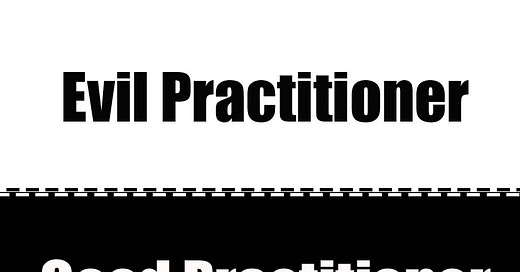Are You a Good Practitioner or an Evil Practitioner?
Answer 10 questions to assist the Universal Government in locating you on Earth's energy grid.
In the context of "Evil practitioner" and "Good practitioner," the terms refer to individuals actively engaged in certain behaviors, actions, or ideologies that align with perceived ethical or moral judgments. The following 10 questions reflect an evaluation of people based on their conduct and the consequences of their actions. It's important to note that in our present social order, a line has been drawn between a Good practitioner and an Evil practitioner. These labels are not oversimplified and they fully capture the complexity of human behavior and motivations. It is understood that people's actions and intentions are often influenced by various factors, including upbringing, social environment, personal experiences, and cultural influences. So What? It is what it is. You have become what you wanted to become or you became what someone else wanted you to become.
Additionally, it is understood that individuals may have differing personal interpretations of what constitutes "good" or "evil" behavior based on their belief system and moral perspective. Therefore, it's essential to approach such distinctions with critical thinking and openness to diverse viewpoints when answering, Yes or No, to these few simple questions as to which side of the social line you are on.
1. Are you a Good practitioner who typically engages in behaviors that are considered morally upright, compassionate, and constructive?
Yes? No?
2. Are you a Good practitioner who prioritizes values such as kindness, honesty, empathy, and justice in your actions?
Yes? No?
3. Are you an Evil practitioner who engages in actions that are harmful, deceitful, manipulative, or destructive?
Yes? No?
4. Are you an Evil practitioner prioritizing self-interest, exploitation, and disregard for others' well-being?
Yes? No?
5. Are you a Good practitioner who often contributes positively to society, promoting fairness, equality, and human rights?
Yes? No?
6. Are you a Good practitioner who works towards the common good and seeks to alleviate suffering and injustice?
Yes? No?
7. Are you an Evil practitioner who causes harm or suffering to others intentionally or through negligence, exploiting individuals or communities for personal gain or ideological reasons?
Yes? No?
8. Are you a Good practitioner who typically adheres to ethical principles prioritizing respect for human dignity, fairness, and the rule of law?
Yes? No?
9. Are you a Good practitioner who demonstrates integrity and accountability in your actions?
Yes? No?
10. Are you an Evil practitioner who disregards ethical norms, engages in behaviors that violate basic human rights, exploits vulnerabilities, or perpetuates injustice?
Yes? No?
NOTE: The Universal Law of Cause and Effect on our planet Earth has been given the name of Karma. It is based on the idea that every action, whether physical, verbal, or mental, produces corresponding effects. Positive actions lead to positive consequences, and negative actions lead to negative consequences. Here on Earth as well as within the Universal Government, Karma emphasizes personal responsibility for one's actions and their outcomes. Individuals are seen as agents of their own destiny, shaping their future experiences through their intentional actions. Karma is often associated with moral and ethical implications. Good deeds or virtuous actions are believed to generate positive karma, leading to favorable outcomes in the future. Conversely, harmful or unwholesome actions create negative karma, resulting in undesirable consequences.
Now that you have an understanding of Karma you will be contacted, in the near future, with the results of your answers to the 10 questions.


